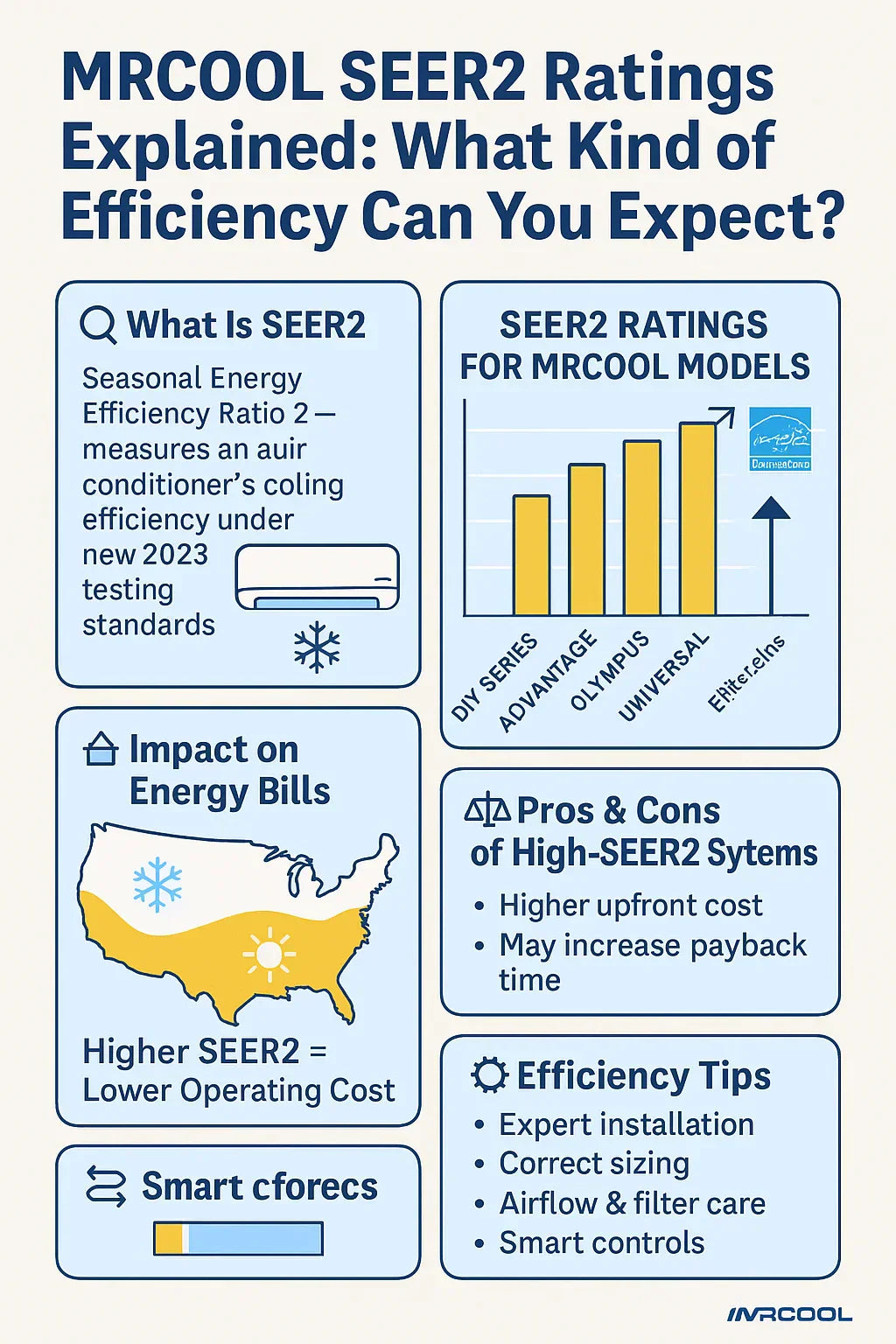🔍 Introduction: Why SEER2 Matters for Your HVAC Investment
When evaluating a ductless mini split system like MRCOOL mini split system, one of the most important numbers you’ll come across is the SEER2 rating. SEER2—Seasonal Energy Efficiency Ratio version 2—is the updated standard launched by the U.S. Department of Energy (DOE) to reflect more realistic testing conditions.
For homeowners, this isn’t just another acronym—it’s a direct measure of how efficiently your cooling system performs over an entire season. The higher the SEER2, the lower your electric bill. So what kind of SEER2 numbers can you expect from MRCOOL’s DIY and Universal series? And how do they compare to other brands? Let’s break it down.
📘 What Is SEER2 and How Is It Calculated?
SEER2 is calculated by dividing the total cooling output (in BTUs) over the cooling season by the total electric energy input (in watt-hours). It’s similar to the original SEER metric, but SEER2 uses new testing procedures that account for more real-world static pressure and system behavior.
➕ Key Differences from Original SEER:
-
SEER2 tests systems under higher static pressure.
-
It simulates more realistic ductwork conditions (even for ductless systems, this affects blower behavior).
-
Typically, SEER2 ratings are 1–2 points lower than equivalent SEER values—but this doesn’t mean less efficient systems. It just reflects tougher testing standards.
⚙️ Typical SEER2 Ratings for MRCOOL Systems
MRCOOL DIY Series (Single-Zone and Multi-Zone)
-
9,000 to 24,000 BTU models:
-
SEER2 Ratings: 20.5 to 22.0
-
-
36,000 to 48,000 BTU multi-zone systems:
-
SEER2 Ratings: 18.0 to 20.0
-
MRCOOL Universal Series (Central-style Heat Pumps)
-
2 to 5 Ton Units:
-
SEER2 Ratings: 17.5 to 18.5
-
These numbers place MRCOOL in the high-efficiency tier of residential HVAC systems, especially within the ductless and DIY categories.
🧮 Real-World Efficiency: What Does a High SEER2 Mean for You?
A higher SEER2 rating directly translates to lower utility bills. For example:
-
A 20.5 SEER2 system uses up to 40% less energy than a 13.4 SEER2 baseline model.
-
In hot climates like Arizona or Florida, this could mean hundreds in savings per year.
💡 Pro Tip: Use the Energy Star Savings Calculator to estimate how much you can save based on your location.
🔄 Heat Pump Efficiency: SEER2 vs. HSPF2
Don’t forget that most MRCOOL mini splits also provide heating. In winter, you’ll want to look at HSPF2 (Heating Seasonal Performance Factor version 2).
-
DIY models offer HSPF2 ratings up to 10.0.
-
Universal series units offer HSPF2 ratings between 8.2 and 9.5.
This makes MRCOOL systems highly competitive for year-round comfort.
🧰 Comparing MRCOOL SEER2 Ratings to Competitors
| Brand | Typical SEER2 (Ductless) | Typical SEER2 (Ducted) |
|---|---|---|
| MRCOOL | 18–22 | 17.5–18.5 |
| Mitsubishi | 20–26 | 16–20 |
| LG | 19–23 | 15–18 |
| Gree | 18–21 | 14–17 |
| Pioneer | 17–20 | N/A |
✅ Bottom Line: MRCOOL offers competitive efficiency, especially when considering their affordability and DIY install features.
🏡 Best Use Scenarios for High-SEER2 MRCOOL Units
-
Home offices that require all-day comfort
-
Sunrooms or bonus rooms with heat gain
-
Converted garages or basements
-
Multi-zone setups where independent temperature control improves overall comfort
If you live in a region with extreme temperatures, investing in a higher SEER2 system will pay off faster.
🧾 Does SEER2 Affect Rebates and Tax Credits?
Yes—most utility and federal incentive programs require a minimum SEER2 threshold to qualify.
✅ Programs to Check:
MRCOOL systems marked as ENERGY STAR Certified generally meet or exceed the thresholds.
📦 Things to Consider Before You Buy
Pros of High-SEER2 MRCOOL Systems:
-
✅ Lower monthly utility costs
-
✅ Environmentally friendly operation
-
✅ Qualifies for more rebates and credits
-
✅ Quieter and more consistent temperature control
Trade-Offs:
-
⚠️ Higher upfront cost vs. base-efficiency models
-
⚠️ Overpaying if system is oversized for your space
-
⚠️ SEER2 drops slightly in extreme heat/humidity—still efficient, just less than lab-tested values
🧠 Mike’s Take: Is a High-SEER2 MRCOOL Worth It?
“For most homes, especially those in hotter or variable climates, MRCOOL’s high SEER2 systems are 100% worth the investment. You’ll notice the difference not just in your utility bill, but in day-to-day comfort.”
If you’re trying to balance budget, performance, and installation flexibility, MRCOOL offers one of the strongest SEER2 value propositions in the mini split and hybrid central HVAC markets.
🔗 External Resources
🧾 Final Thoughts
Whether you’re upgrading an old unit or outfitting a new build, understanding MRCOOL’s SEER2 efficiency ratings helps you make a smarter HVAC investment. The numbers show that MRCOOL provides competitive performance, ease of installation, and eligibility for major savings programs—making it a top pick for value-conscious homeowners.
In the next topic we will know more about: Can MRCOOL Mini Splits Handle Cold Winters? Real Performance in Freezing Temps







